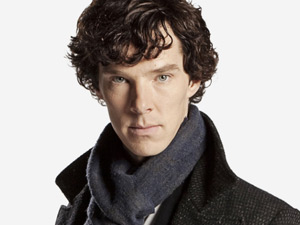I have long been a big fan of the Jeremy Brett version. He is the epitome of all the Holmes'. That series by Granada TV in the 80's. Perfect stuff.
Back in 1991-92, when the new life I moved to SF to start was falling apart, a four-year relationship dissolving unpleasantly before my eyes, watching that show was at least one time a week when I could forget it all and just enjoy being wholly in another place and time.
The new BBC version is decidedly contemporary both in time (right now) and feeling. Watson is a military doctor... but just back from Afghanistan^^, with some depression and bit of PTSD. Holmes is self-described as "a high-functioning sociopath", and possibly gay, to boot. The pace of the stories is very fast, jagged, manic. Our obsession with laptops and cellphones is prominent. The human relations involved seem more spare, even sporadic, and consequently the train of clues is emphasized and made more complex, dense and heady.
Re: supporting characters. LeStrade (Rupert Graves), rather than being the self-important fool, is a critical but strong supporter of Sherlock. Mrs. Hudson does the Mrs. Hudson thing, all the while proclaiming, "I am not your housemaid." One subplot snookered me. The character I thought was Moriarty turned out to be someone entirely different. Clever.
Benedict Cumberbatch (!) is no Jeremy Brett --how could he be, being so 21st century non-Victorian?-- but interesting. This is modern London --the city skyline figures frequently.
 They are not "Holmes" and "Watson" to each other but "Sherlock" and "John". Once it becomes clear to Watson that his new roommate is playing for the other team, (a restaurant owner assumes they are on a date) a brisk and funny exchange makes it a playful non-issue between them. Except when Holmes introduces him as his "friend", --and people who know Holmes make the sexual assumption-- he always corrects it to "colleague." When Sherlock notices that a nurse who could be helpful in his investigation is flirting with him, he makes comments about her makeup and her hair, but it's clear that he is manipulating her rather than being really interested. Believable.
They are not "Holmes" and "Watson" to each other but "Sherlock" and "John". Once it becomes clear to Watson that his new roommate is playing for the other team, (a restaurant owner assumes they are on a date) a brisk and funny exchange makes it a playful non-issue between them. Except when Holmes introduces him as his "friend", --and people who know Holmes make the sexual assumption-- he always corrects it to "colleague." When Sherlock notices that a nurse who could be helpful in his investigation is flirting with him, he makes comments about her makeup and her hair, but it's clear that he is manipulating her rather than being really interested. Believable. Although he is younger than the other Holmes', with a fine-featured pale porcelain face* utterly unwrinkled and thick curly hair, making him gay has, so far, blessedly not meant making him fey.
Although he is younger than the other Holmes', with a fine-featured pale porcelain face* utterly unwrinkled and thick curly hair, making him gay has, so far, blessedly not meant making him fey.Holmes and Watson are a classic alpha/beta male pairing, but it would have to be a 21st century tweek to have a homosexual alpha with a heterosexual beta. What connects them is not sexual. Holmes' brain and action gives Watson someone to become a brother-in-arms to again, while Watson's practicality and connection to the world allows Holmes' to allow himself a bit of feeling and play, to finally have a friend.
One leads, the other follows, but the common male style gives the power differential an undramatic (non-erotic) friendliness, something you'd find hard to replicate in a male-female dyad like this. When men and women couples battle for power, they are representatives of vast trans-personal archetypal tribes, an immemorial "war between the sexes". But two males in the complementary alpha/beta structure are simply individual men within a common tribe; their shared and valued masculine identity makes their two-man hierarchy a form of bonding rather than bondage. And men usually have a much better sense of humor about each other than women have about either men or other women.
The autumn 2011 set of episodes will re-do A Scandal in Bohemia, House of the Baskervilles and Final Problem. Will be fascinating to see how they translate those into our time.
^^ As was the original character, who was wounded there as well.
*In an interview, Cumberbatch said that he went on a diet to allow his face to show more bone structure, to give Sherlock "an ethereal, intellectual" quality.

No comments:
Post a Comment